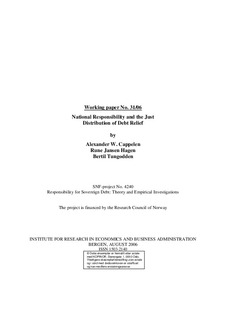| dc.description.abstract | A central question in the debate on debt relief has been whether or not highly indebted poor countries should be held responsible for their sovereign debt. Proponents of debt relief typically argue that this is not fair because many of these countries are highly indebted as a result of borrowing that the population did not consent to, while critics of debt relief argue that countries ought to be held responsible for their national policies. In important respects this discussion mirrors the recent theoretical debate on distributive justice. Liberal egalitarian theories of justice focus on the necessary conditions for responsibility and on what it means to hold agents responsible. In this paper we apply insights from the liberal egalitarian framework to analyse some features of recent debt relief programmes such as the Highly Indebted Poor Countries initiative (HIPC). In particular we are engaged with two questions. First, we address the question of what principles should guide the design of a just debt relief programme. Second, we ask whether existing debt programmes, in particular HIPC, adequately express these principles. | en |
